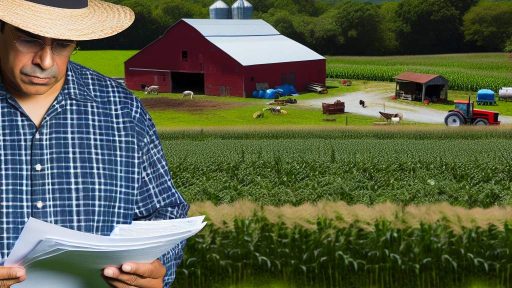Introduction to Farm-To-Table Policies and Their Importance
Farm-to-table policies focus on connecting farms directly with consumers.
This approach promotes local food production and consumption.
Farm-to-table systems enhance sustainability in agriculture.
By prioritizing fresh produce, they reduce transportation emissions.
Moreover, they support local economies through small-scale farming.
Farm-to-table initiatives encourage healthier eating habits.
Consequently, they improve community well-being and nutrition.
Many restaurants and markets adopt these policies to serve fresh food.
This trend fosters stronger relationships between farmers and consumers.
Furthermore, it raises awareness about the importance of sustainable practices.
Environmental Benefits
Farm-to-table practices significantly reduce carbon footprints.
Transportation is minimized, lowering greenhouse gas emissions.
Additionally, local farming often involves organic or sustainable methods.
This practice enhances biodiversity by preserving native species.
As a result, local ecosystems thrive and water usage decreases.
Transform Your Agribusiness
Unlock your farm's potential with expert advice tailored to your needs. Get actionable steps that drive real results.
Get StartedEconomic Advantages
Farm-to-table policies boost local economies by keeping money in the community.
Consumers often support small farms and local producers.
This creates jobs within the agricultural sector.
Moreover, it fosters innovation in farming and food production.
Consumers also benefit from often lower prices for fresh produce.
Health Impact
Eating locally sourced food promotes better nutrition and health.
Fresh produce contains more nutrients compared to processed foods.
Farm-to-table initiatives can reduce foodborne illnesses.
They also encourage consumers to consider the origins of their food.
This shift leads to more informed food choices overall.
Economic Benefits: Supporting Local Farmers and Businesses
Boosting Local Economies
Farm-to-table policies create a direct connection between consumers and local farmers.
This connection strengthens local economies and promotes the growth of community businesses.
When consumers support local farms, they contribute to job creation in their area.
Moreover, local farmers keep a larger share of their profits, benefiting the community significantly.
Encouraging Sustainable Practices
Many local farmers adopt sustainable agricultural methods when they see consumer demand grow.
These practices not only benefit the environment but also improve food quality.
Additionally, sustainability leads to a healthier ecosystem that supports agriculture.
As a result, farm-to-table policies encourage innovation among farmers.
Increasing Freshness and Quality of Produce
Local sourcing ensures the delivery of fresher produce to consumers.
Fresh food retains more nutrients and flavor, enhancing the dining experience.
This quality encourages consumers to choose local products over imported goods.
Furthermore, businesses thrive by offering high-quality, fresh ingredients.
Strengthening Community Identity
Farm-to-table initiatives foster a unique community identity.
Local restaurants often highlight regional ingredients in their menus.
Showcase Your Farming Business
Publish your professional farming services profile on our blog for a one-time fee of $200 and reach a dedicated audience of farmers and agribusiness owners.
Publish Your ProfileThis emphasis on local food helps to cultivate pride in the community’s agricultural heritage.
Community events, such as farmer’s markets, also enhance social interactions among residents.
Building Trust Between Producers and Consumers
Transparency about sourcing increases consumer trust in food systems.
When people know where their food comes from, they feel more connected to it.
Furthermore, trust leads to loyal customers who actively support local businesses.
This loyalty translates into sustainable growth for farmers and businesses alike.
Environmental Impacts: Reducing Carbon Footprint and Promoting Biodiversity
Lowering Greenhouse Gas Emissions
Farm-to-table policies significantly contribute to lowering greenhouse gas emissions.
These policies encourage local sourcing of food products.
By reducing transportation distances, these systems decrease fossil fuel consumption.
Consequently, they help mitigate climate change effectively.
Enhancing Local Ecosystems
Farm-to-table practices enhance local ecosystems through sustainable farming methods.
These methods promote organic farming, which reduces harmful chemical use.
In addition, they encourage crop rotation and biodiversity on farms.
As a result, soil health improves while harmful pests diminish.
Supporting Biodiversity
Promoting local food systems significantly supports biodiversity.
Farm-to-table initiatives foster the cultivation of heirloom and native species.
This practice leads to a richer variety of plants and animals.
Consequently, it helps maintain a balanced ecosystem.
Community Engagement and Education
Community engagement is crucial in promoting ecological awareness.
Farm-to-table policies foster connections between consumers and local farmers.
This interaction encourages understanding of ecological practices.
Moreover, it empowers consumers to support sustainable agriculture.
Reducing Food Waste
Farm-to-table initiatives also address food waste issues more effectively.
By sourcing food locally, less storage time is needed.
This approach minimizes spoilage and waste.
Consequently, communities become more efficient in their food systems.
Delve into the Subject: Steps to Apply for Agricultural Insurance Coverage
Health Advantages
Enhancing Nutrition
Farm-to-table policies significantly enhance the nutritional quality of food.
Fresh produce typically contains higher vitamin levels compared to processed foods.
Locally sourced ingredients often have a shorter time from harvest to table.
This freshness preserves vital nutrients that can degrade over time.
Moreover, seasonal foods boast richer flavors, appealing to diverse palates.
Consequently, this approach encourages healthier eating habits among consumers.
Improving Food Quality
Farm-to-table initiatives champion high standards of food quality.
Local farmers are more likely to produce organic and sustainably grown options.
These practices reduce the likelihood of harmful chemicals in our diet.
Additionally, consumers can often learn about food sourcing directly from producers.
This transparency fosters a sense of trust between consumers and their food sources.
Supporting Local Economies
Supporting local farms boosts regional economies significantly.
When consumers purchase directly from farmers, money circulates within the community.
Showcase Your Farming Business
Publish your professional farming services profile on our blog for a one-time fee of $200 and reach a dedicated audience of farmers and agribusiness owners.
Publish Your ProfileThis practice creates jobs and promotes a stable food supply chain.
Furthermore, local businesses thrive due to increased demand for fresh ingredients.
As a result, community members enjoy better access to high-quality foods.
See Related Content: Water Conservation Strategies In Agricultural Policies
Community Engagement: Strengthening Local Communities Through Direct Relationships
The Importance of Direct Relationships
Direct relationships foster trust between farmers and consumers.
These connections promote transparency in food sourcing.
As a result, consumers feel more invested in their local food systems.
Building Local Economies
Farm-to-table policies encourage purchasing from local farms.
This action supports local economies and creates jobs.
Moreover, it keeps money circulating within the community.
Enhancing Nutritional Education
Engaging directly with local farmers provides educational opportunities.
Consumers learn about seasonal produce and nutritional benefits.
Workshops and farm visits enrich community knowledge.
Creating a Sense of Community
Farm-to-table initiatives bring people together.
Farmers’ markets serve as gathering places for community interaction.
These events foster relationships among community members.
Supporting Sustainable Practices
Engaged communities support sustainable farming practices.
Consumers often advocate for eco-friendly methods.
This collaboration can lead to positive changes in agriculture.
Strengthening Community Resilience
Communities benefit from localized food systems during crises.
Direct relationships provide stable access to healthy food.
Such resilience helps communities thrive amid challenges.
You Might Also Like: Top Renewable Energy Tax Credits Available to Farmers

Cultural Value: Preserving Traditional Farming Practices and Heritage
Importance of Heritage in Farming
Traditional farming practices carry deep cultural significance.
They reflect the history and heritage of communities.
These practices foster a strong sense of identity.
Moreover, they connect communities to their ancestral roots.
Connection to Local Communities
Farm-to-table initiatives strengthen ties between farmers and consumers.
They create a sense of community through shared values.
These connections foster local pride among residents.
Additionally, they promote support for local farmers and businesses.
Educational Opportunities
Farm-to-table policies enhance educational initiatives.
They teach consumers about nutrition and sustainable practices.
Schools can work with local farms to provide fresh produce.
This integration enriches the educational experience of students.
Preservation of Biodiversity
Embracing traditional practices helps maintain biodiversity.
Farmers often grow a variety of crops unique to their region.
This variety sustains local ecosystems and contributes to resilience.
Furthermore, it encourages the use of heirloom seeds.
Challenges Facing Traditional Practices
Despite their benefits, traditional methods face numerous challenges.
Showcase Your Farming Business
Publish your professional farming services profile on our blog for a one-time fee of $200 and reach a dedicated audience of farmers and agribusiness owners.
Publish Your ProfileModern agricultural trends prioritize quantity over quality.
This shift threatens the survival of heritage crops.
Additionally, younger generations may not pursue farming careers.
The Role of Policy in Preservation
Effective policies can support the continuation of traditional practices.
They can provide funding and resources to local farmers.
Pursuing grants can reinforce the importance of heritage methods.
Moreover, community programs can promote cultural heritage awareness.
Explore Further: Impact Of Trade Policies On Sustainable Agriculture Development
Policy Framework for Farm-To-Table Initiatives
Defining Farm-To-Table Policies
Farm-to-table policies focus on sourcing food directly from local farms.
These policies promote direct relationships between consumers and farmers.
They aim to reduce food miles and carbon footprints.
These initiatives encourage organic and sustainable farming practices.
Key Guidelines for Implementation
Effective farm-to-table policies emphasize local food systems.
First, establish partnerships with local farmers and producers.
Next, develop clear standards for food sourcing.
In addition, promote education and awareness about local foods.
Finally, support small businesses through community programs.
Support Mechanisms for Farmers
Funds and grants can help farmers transition to sustainable practices.
Local governments should provide technical assistance and training.
Additionally, marketing support can increase visibility for farmers.
Collaboration with local organizations enhances resource sharing.
Engaging Consumers and Communities
Engaging communities fosters a culture of sustainability.
Local events can help promote farm-to-table initiatives.
Farmers’ markets encourage direct consumer interaction.
Education programs can highlight the benefits of local eating.
Moreover, community-supported agriculture fosters consumer investment.
Monitoring and Evaluation
Regular assessments ensure the effectiveness of policies.
Metrics should be established to measure policy impacts.
Feedback from stakeholders helps in refining these initiatives.
Additionally, successful case studies can guide future efforts.
Challenges and Solutions: Addressing Barriers to Successful Farm-To-Table Models
Understanding Common Challenges
Farm-to-table models face several significant challenges.
These include limited access to local food sources.
Additionally, the prevalence of large-scale agriculture complicates viability.
Transportation issues can also disrupt supply chains.
Moreover, consumer awareness about local food benefits is often low.
These obstacles impact the growth of farm-to-table initiatives.
Access to Local Food Sources
Access remains a primary barrier for many regions.
Rural areas often lack infrastructure to support local farmers.
This limits the availability of fresh products.
Urban centers may struggle with insufficient local farms.
Showcase Your Farming Business
Publish your professional farming services profile on our blog for a one-time fee of $200 and reach a dedicated audience of farmers and agribusiness owners.
Publish Your ProfileTo counter this, communities can create farmers’ markets.
These markets increase direct access to local produce.
Transportation and Distribution Issues
Transportation poses logistical challenges for local producers.
Rural farmers often find it hard to reach urban markets.
Logistical constraints can increase costs significantly.
Collaboration among farmers can ease distribution issues.
Pooling resources for transportation can create efficiency.
Developing delivery networks can help reach consumers effectively.
Building Consumer Awareness
Consumer awareness directly affects farm-to-table success.
Many people are unaware of the benefits of local food.
Education campaigns can play a vital role in addressing this issue.
Workshops and community events can inform consumers.
Using social media to promote local options is effective.
Partnerships with local chefs can showcase seasonal menus.
Cultivating Community Support
Community support is crucial for successful initiatives.
Engaging local governments can lead to policy changes.
Supportive policies can reduce barriers for farmers.
Incentives for purchasing local food benefit consumers and farmers.
Creating support networks among local stakeholders is essential.
This fosters collaboration and knowledge sharing.
Creating Sustainable Practices
Developing sustainable practices enhances farm-to-table models.
These practices should focus on soil health and biodiversity.
Farmers can adopt organic farming techniques for better yields.
Additionally, implementing crop rotation can improve soil quality.
Encouraging regenerative agriculture practices benefits everyone.
Sustainability attracts more consumers to local food options.
Additional Resources
Farmers Employ Strategies To Reduce Risk of Drought Damages …
Animal Policy & Regulatory Issues | Economic Research Service




